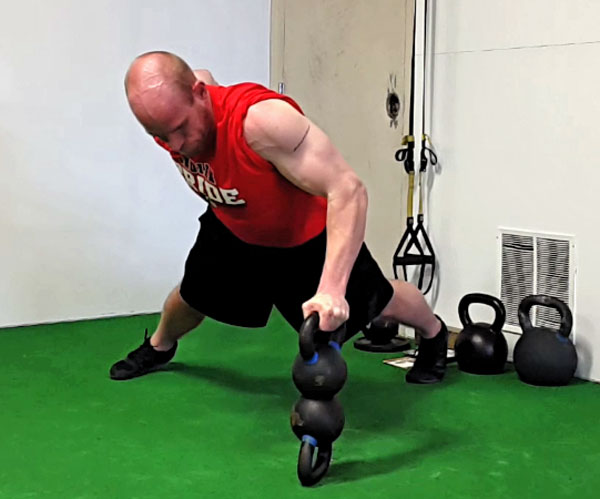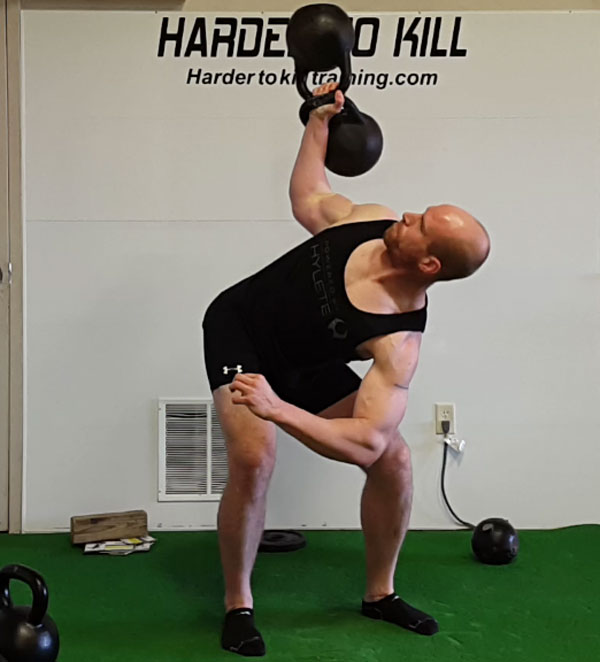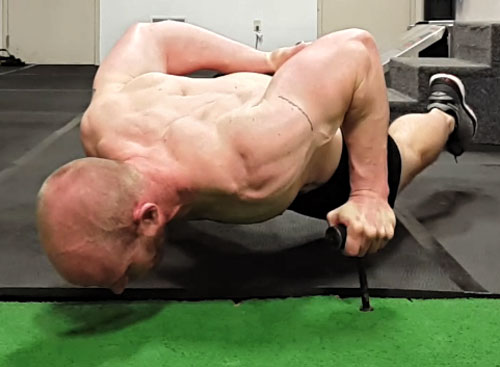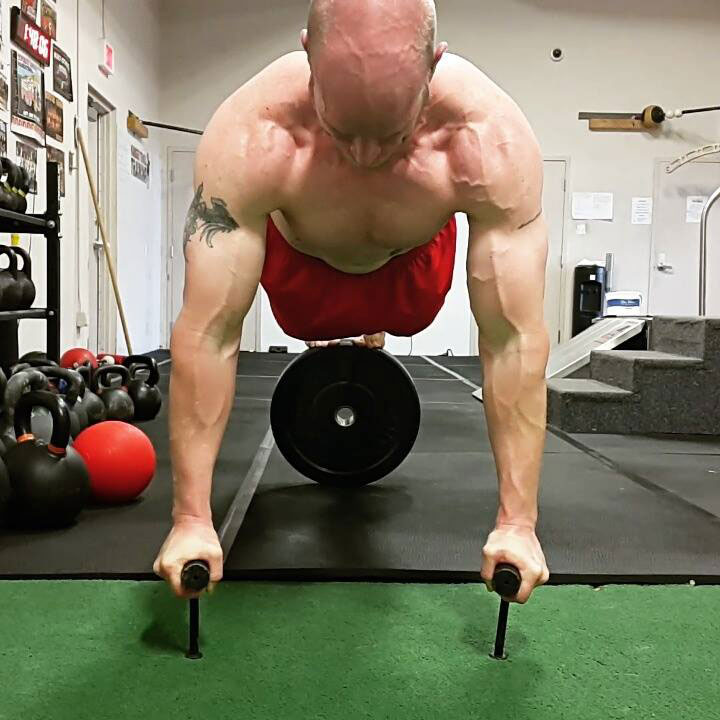From Obese to Hyper-Fit, The Levi Markwardt story
By Adrienne Harvey, SrPCC, RKC-II, CK-FMS

Dragon Door: How did you first get into kettlebells and athletics?
Levi Markwardt: I grew up playing sports—my dad was my high school wrestling and football coach. I grew up as the team manager for wrestling and football, participated while in junior high and high school, and continued wrestling in college. After graduation I started my training career working with young athletes mainly in junior high and high school. I occasionally train younger athletes and collegiate athletes too.
Eleven years ago the end of this month, my dad passed away at age fifty from pancreatic cancer. At the time, I was 28, very unhealthy and nearly 300lbs. After he had passed, I realized my training wasn't working. I had been jogging on the treadmill and doing the classic bodybuilding exercises. I don’t want to discredit them, but they were not working for me, and I was not using them properly. Needing a change, I found Ross Enamait’s website and reached out to him. His response was absolutely amazing. I started following his bodyweight program in 2006 and never looked back. Without Ross, I don't think any of this would have happened.
Then in the summer of either 2012 or 2013, a good friend who is also an RKC—Joshua Berven —was visiting me. I had taken two
20kg and two
24kg kettlebells as a down payment for a gym membership from someone who wasn’t using them. They were sitting in the gym collecting dust because I didn’t know what to do with them either. Joshua saw them and asked me if I knew how to use them. I said, "Nope!" Then he asked me if I wanted to learn how to learn how to use them. That was the beginning of what I am now, and it has been an amazing journey.
He taught me everything almost like a workshop but one on one. We spread it out for a couple of 4 hour days. So, even though I wasn’t able to keep training with a coach, I had a great start and continued to train on my own. When I went to the
RKC, I had a solid foundation.
Andrea Du Cane was able to pick me apart in a few different areas, then I was able to correct a few form issues—and that's when things really took off.
Dragon Door: What are some of the biggest changes or results you've noticed in your training after you started getting into kettlebells.
Levi Markwardt: Probably the biggest thing was efficiency. Details like making sure that my hinge was consistent on every rep, and letting the kettlebell handle rotate during the snatch instead of over-gripping. Now I am also smarter with my programming—as an old wrestler sometimes my mindset has been
go go go go go—now I have a better understanding when enough is enough, when to scale back some days and train smarter to fight another day. It's an evolving process, I don’t have it figured out all the time, but it’s definitely better.

Dragon Door: What are your training sessions like? I always see your very cool and challenging feats on Facebook, but was curious as to how your train day to day.
Levi Markwardt: I love the strength endurance aspect of training, which probably goes back to my wrestling background. I like to push myself and try to out work a previous session or any preconceived notion about my training. So, I love high rep snatching, and do a lot of get-ups which are probably my favorite exercise. I try to do a lot of different get-up variations with waiter holds, bottoms up, chains, and bars—anything to challenge me while keeping the training fresh.
Dragon Door: What do you like the most about get-ups?
Levi Markwardt: The get-ups give so much more than they take from you. As a wrestler, my shoulders took a beating all throughout my competitive years. Now my range of motion and stability are so much better than they used to be. After years of competitive sports, I had disc herniation, lower back fractures, imbalances, and other past injuries. I could have made excuses (and I did for years) because my body hurt—and the weaknesses and dysfunctions would have gotten worse. But when I learned to do a get-up correctly, it allowed me the freedom to move again, and not only fix what was broken but come back much stronger than before. At first I could barely do a get-up with 20kg.
Dragon Door: Earlier you mentioned training athletes, are they still your main demographic?
Levi Markwardt: Yes, I have a 24hr gym which has two parts—one part has 24 hour access for adult members, but the bulk of my business comes from training athletes. I’m a franchisee in the Athletic Republic network, so we do a lot of sprint training, agility, and plyos.
Kettlebells fit in amazingly well with the Athletic Republic model. I am also a strength coach at the local high school where I spend about 5 hours a day in the morning and afternoon. I spend the rest of my time at the gym. I also have an online training business.
Dragon Door: How are you using the kettlebells with your young athletes?
Levi Markwardt: With my own development, I realized that I needed to train the athletes for rotational strength and anti-rotation with single arm work. Almost every sport involves running, but even sports that don't involve running (like golf) still have a lot of rotation. So, we do a lot of single arm swings and front squats. For athletes who are able, we still use a lot of barbell work, including back squats at the school. But I think the kettlebell front squat—double racked or goblet—is often overlooked and many times more important for a young athlete’s development than back squats. We train with a lot of swings, get-ups and front squats with the kettlebells.
Dragon Door: What are some of the biggest challenges you’re helping these athletes overcome?
Levi Markwardt: Mentally, the patience in letting things happen. We're just so impatient as a society, and it’s tough for them to see beyond their four years of high school, I couldn’t at that age either. It’s also a challenge for them to be consistent because there are so many things that are grabbing their attention with school, other extracurricular activities, sports, relationships, family—they're very busy and distracted.
On the physical side of things, they’re learning what we've lost like crawling or even allowing their bodies to move in a get-up. So much of traditional weight training is limited in what it provides beyond strength, and is limited to certain planes and ranges of motion. We need to make sure that we’re training to perform and compete in the same way we’re playing sports.
Dragon Door: What are some of your goals for your own training?
Levi Markwardt: My big picture goals are a bodyweight get-up and a bodyweight bent press. I am close in both of them, about 90-95%
as of Tuesday. But because of my schedule in the summer I will have to table them. During the summer, my training is focused on maintaining my strength and some level of conditioning. I will be participating in a local half marathon and trying to not lose what I've built up to this point. At the end of the summer, I’ll pick up where I left off with the get-up and bent press goals.
I find that these two lifts are absolutely amazing in the benefits they provide, even though they take a lot out of you. I have been very focused on the bent press up until taking an intentional step back in the beginning of May to reset and regroup. I will attack it again in the fall.
I think that both are attainable goals, I already broke 200lbs in the get-up and am just below it in the bent press with a barbell. It's a fun journey, extremely challenging, but equal parts rewarding and frustrating.
Dragon Door: One of the things I noticed about you right away was how you are very creative with your workouts and challenges—especially using Neuro-Grips, chains, and bands. What’s inspired you to try some of these feats?
Levi Markwardt: I really suck at the traditional barbell exercises—bench, squat, and deadlift—and have zero desire to do them! I understand that they're beneficial, program them for my athletes, and of course know how to do, teach, and regress them. The only problem is that I don’t like doing them, so I’ve tried to challenge myself in ways outside of traditional training.

I love the
Neuro-Grips, they change everything, and they make everything much more difficult and challenging. They force me to correct form issues and create tension—I mean you use them, you know exactly what they do! When I add them to a
bar for pull-ups, it changes the grip, forcing me to really squeeze otherwise they'll slide, metal on metal. I have to be really aware when training with them. It heightens my senses.
From creativity standpoint, I just like to be challenged. I don’t like to just get things right the first try—instead I’d rather have to figure it out. Before kettlebells, burpees were my go-to, then burpee pull-ups, and burpee muscle ups. The first time I tried the Neuro-Grips, I couldn't do two consecutive pushups. I couldn't believe how hard it was, so once I consistently hit double digits with Neuro-Grip push-ups, I wondered what they would do to my burpee. At first I was smashing my face and fingers on the floor, but I was soon able to do burpees with them.
Of course my next thought was burpee pull-ups, but it wasn’t efficient to let them bounce on the floor as I grabbed the pull-up bar with my hands. I wondered if I could just hang on to them and still do the pull-up. The first few reps were a little shady and ugly, but I figured it out and then did the same with a muscle-up burpee variation.
A lot of my training is based on "I wonder if I can..." I’ve definitely found some things where that I could not do and that were not worth trying again, but others that I just needed to make a few adjustments. I have learned so much from filming myself a lot because I don’t have the same coaching eye I have for my athletes available for me. With video, I can see my mistakes, what I can improve, and where I can be more efficient.

Dragon Door: Using video can be such a powerful coaching and self-coaching tool!
Levi Markwardt: I encourage my gym members to do it as well, and even have a tripod in my gym for them to use with their phones.
Dragon Door: What's next for your training business?
Levi Markwardt: Right now we are gearing up for summer. We start our pre-season football training and off-season training for winter sports right when school gets out. And we only have one more week of school left. During the summer I also train kids from other high schools. We work on getting everyone as efficient and strong as possible for the next three months before we cut them loose in the fall. I am planning on a big summer. There are even more personal training clients this year who want to train over the summer—even though I don't market to the adults but this year there seems to be more interest.
Back